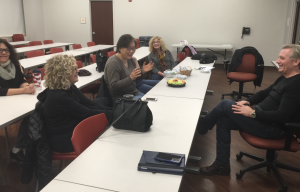If there is such thing as a traditional path into constructing an adult autism program, Moish Tov has not followed it. A serial entrepreneur with experience in the technology and medical device industries, Tov’s path to building an adult autism program emanated from his two children (who both have autism). Upon visiting various potential adult programs, he found himself disappointed: “I had the assumption that we would find a good solution - and a good solution for me is a place that allows them to live up to their potential, like any other person.”
After having conversations with parents experiencing similar disappointments with existing programs, he noticed that “21 is like a cliff. When you pass 21, you have to make a lot of decisions: about education, what kind of work you do, where you want to live. It’s a complex issue.”

Tov speaking at a recent meeting of the Post 21 Club.
Tov’s first experience building a skill-based program for people with autism was a program within the Israeli military:
“The Israeli intelligence community, the Mossad, had a problem. They didn’t have a good way to analyze satellite pictures. I knew that our kids - people with autism - they have their own strengths. Some of them have very good vision. So we put one and one together. We taught them how to read satellite imaging. We got them used to doing it, and we created a special environment for them, what we called an autism-friendly environment - and we got to work. And after four or six months, the results showed that they are three times more productive, and four times more accurate than their peers. So the Mossad said, give us more. Today they have 100. So that was the start.”
His experiences in Israel gave him clarity on building his own program:
“First, we decided that we’d focus on employment. So that they’d have a place that they could come and work, that they’d have people like themselves, they’d have a community and social life, and they’d have job training on a high level.”
On a recommendation from a family member of a participant, Tov organized a mammogram reading and analysis trial for adults with autism. The program remains in existence today.
“We have a small career center in Morris County and we’re going to bring one over here, and we’re teaching a group of 10 people how to look at mammograms. About 7 out of 10 are not verbal - we teach them how to compare the mammograms - they use a screen, and they mark differences between one and the other, and then the radiologist can do the diagnosis. It save a lot of time for the radiologist - because they can focus on the diagnosis and not the screening. It gives them 60% more time, and we are increasing the accuracy of the earlier diagnosis by 10 to 15 percent, which is quite good.”
He emphasized that the philosophy of JoyDew critically valued the cultivation of talent:
“We call this Talent and Career Development. We develop the talent of our members, and then the career side, we want to train them in about 15 different jobs, all of them technology and media related… We see that all of these adults have strengths - and when we talk about strengths, when you compare their strengths in these areas to their peers, they are competitive to their peers. They just need to have the right environment and the right way to train them to do the work and to deliver the work. And then they can do much better in certain areas than their peers.”
He elaborated on the ideas that underpin his beliefs:
“If you want to get people employed, you have to find their strengths. But you have to create the environment that will support their needs. And if you don’t create this environment, it makes it harder to succeed… If you treat them like a stigma, like there is no human being inside, you’re missing out.”
When asked to elaborate on his views, Tov compared the social and economic treatment of people with autism to his own experiences as an immigrant:
“I think the best example - and I am part of it - is immigration, the immigrant experience. When I came from Israel to the U.S., I had very bad English. You come, you’re full of knowledge, you just don’t have the ability to express it. And then people look at you as if you’re not smart, you don’t have potential. One thing that when I tried to communicate to people is to make the analogy between different groups.”
In closing, Too spoke about the critical role parents must play in the post 21 experience:
“This kind of effort is not done by one person. We need a village. And the village is the parents. Because the parents are the ones who care about it. We have to come together and agree about what were doing and do it.”
-
“We are building a new path. I haven’t seen a program like this. If I did, I most likely would’ve sent my kids there.” - Moish Tov

